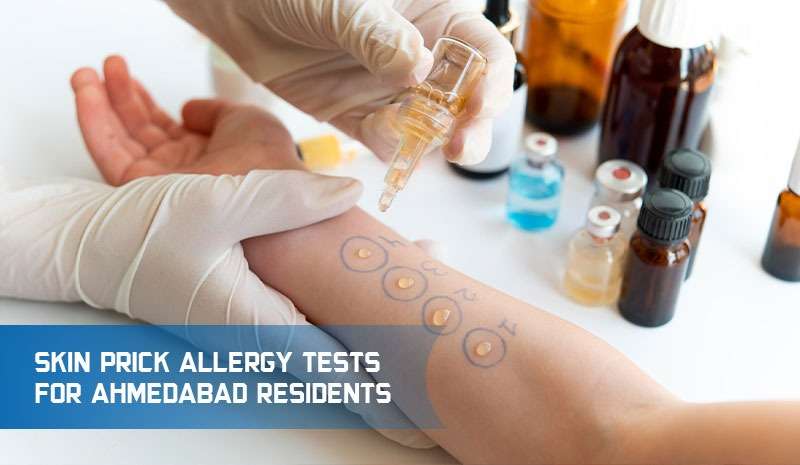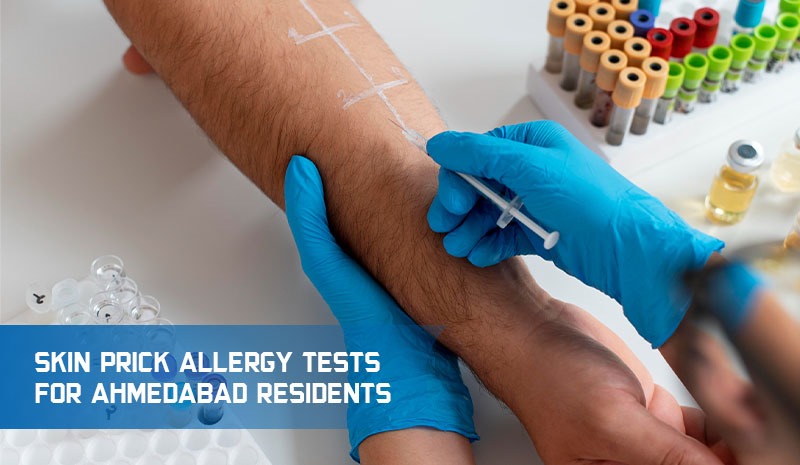If you’re an Ahmedabad resident struggling with sneezing, itching, or unexplained allergic reactions, your doctor may recommend a skin prick allergy test. But what exactly is it? Is it painful? And how accurate are the results? In this post, we’ll break down everything you need to know about Skin Prick Allergy Tests For Ahmedabad Residents, in the form of easy-to-understand, frequently asked questions. Let’s take the mystery out of allergy testing—one answer at a time.
1. What is a skin prick allergy test?
A skin prick test is an easy, painless way to check for allergy to pollen, dust, dog and cat dander, food, and many more. A small quantity of allergen is put on your skin (forearm or back), and then the skin is pricked lightly. If you are allergic, a small red bump will develop.
2. Why should I undergo a test in Ahmedabad?
Ahmedabad’s dry climate and increasing pollution can cause respiratory and skin allergies. Some triggers will be identified through tests so you can avoid or regulate them.
3. Is the test painful?
It is very uncomfortable for a few of us, but it is not painful. You will feel a little scratch or prick—no needles or blood.
4. How long is the test?
The entire process typically takes 20–40 minutes, including wait time included to observe reactions.
5. Which allergens are being tested in Ahmedabad?
Ahmedabad clinics screen routinely:
- Pollen of indigenous grasses and trees (e.g., gulmohar or neem)
- House dust mites
- Molds
- Pet dander
- Food (milk, nuts, seafood)
- Insect toxin (e.g., mosquitoes or ants)

6. Must I discontinue any medication before testing?
Yes. Some medications, especially antihistamines, will influence test results. Your doctor will usually have you stop taking them 3–7 days before testing.
7. Where can I have a skin prick allergy test in Ahmedabad?
This test is available at most ENT specialists, dermatologists, and allergy clinics in areas like Navrangpura, Satellite, and SG Highway. It is better to go to a clinic with a good allergist.
8. Is the test covered by insurance?
Coverage is different with your health insurance provider. Some plans will pay for allergy tests in part or in full—call your insurance provider before booking.
9. What comes next after the test?
If you do react, your physician will tell you what you are allergic to and how you can control it with avoidance, medication, or immunotherapy.
10. Can children be given the test?
Yes, 6-month-old babies are able to have skin prick testing, although it’s more commonly done in children over 2 years.
11. Who is most likely to give this test in Ahmedabad?
Residents who suffer from repeated sneezing, a runny nose, watery eyes, rashes on the skin, or asthma-like symptoms—especially during season changes—need to be screened for allergies. Dust mites, pollen, mold, and certain foods are usual local allergens in Ahmedabad.
12. Is the test painful?
Not at all. Most individuals experience only a light pricking or stinging. It is usually well tolerated even by children.
13. How long is the test?
The test will typically take 20 to 30 minutes, with waiting time to observe the reaction when the allergens are applied.
14. What are the common allergens tested in Ahmedabad?
Some commonly tested allergens for Ahmedabad residents include:
- Dust and dust mites
- Local grass and tree pollen
- Mold spores
- Animal dander (dog, cat)
- Insects (like cockroach allergens)
- Common local foods (peanuts, milk, wheat, etc.)
15. Should I discontinue medications before the test?
Yes. Some medications, such as antidepressants and antihistamines, can impact test results. Your physician will inform you which ones to stop and when.
16. Is the test safe? Are there side effects?
Yes, it’s very safe. Side effects are usually only minor redness or swelling at the site where the test is done. Severe allergic reactions are rare and usually occur under a physician’s supervision.
17. Will my insurance cover the test?
It is not evenly covered. Some private insurers might cover diagnostic allergy testing, so it is advisable to inquire with your insurer in advance.
18. What is done after the test?
After the outcome is established, your physician will walk you through an allergy treatment plan. The plan may involve avoiding allergens, medications, or, in certain situations, allergy shots or immunotherapy.
 +919979891672
+919979891672 











No Comments